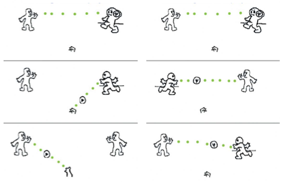The Neural Bases of Social Rejection
When people feel rejected or left out, they often describe their feelings with physical pain words, complaining of “hurt feelings,” “broken hearts,” or “feeling crushed.” However, is feeling socially estranged truly comparable to feeling physical pain or is this merely a figure of speech? Our research has shown that feeling socially excluded activates some of the same neural regions that are activated in response to physical pain, suggesting that social rejection may indeed be “painful.” To follow up on this research, we are currently examining the genetic determinants of rejection sensitivity as well as whether the fear of rejection relies on different neural circuitry than the experience of it.

The Neural Bases of Social Connection
We all know the feeling that we have when we feel truly connected to someone else—warm, safe, loved. However, we know very little about the neural circuitry that underlies this feeling or the physiological processes that accompany it. We are currently investigating the neural and physiological substrates associated with feeling “social warmth,” the positive, contented experiential state associated with being in the company of close others.

Social Support and Health
Over the past several decades, researchers have shown repeatedly that having social support is beneficial for physical health whereas not having it increases the risk of morbidity and mortality. Although social support is a robust predictor of physical health, comparable to other risk factors such as smoking and high blood pressure, little is known about how social support influences health. In our lab, we use neuroimaging techniques to examine the neural processes that translate perceptions of social support or a lack thereof into the health outcomes that follow.

From Brain to Body: Examining the Neural Underpinnings of Stress-related Physiological Responses
We all know that stress is bad for us—making us more likely to get sick and stay sick. One question that has puzzled health researchers for some time now is: “How does stress get under the skin?” In other words, how does stress (which seems like it’s mostly in the head) make us sick (which seems like it’s mostly in the body)? Our work investigates the neural systems that are activated in response to stress and how these systems relate to downstream physiological stress responses to get a better understanding of the mechanisms that link stress with negative health outcomes.

From Body to Brain: Examining the Effects of Immune System Activity on Neural Responses
Although the immune system seems like a physiological system that is separate from cognition and affect, recent work has shown that the activity of the immune system can have a profound effect on our thoughts and feelings. Inflammatory processes, one component of immune system activity, can trigger “sickness behavior,” which includes fatigue, social withdrawal, and heightened pain sensitivity, in order to fight off illness. These sickness behaviors overlap with some of the symptoms of depression and some have argued that there may be a link between inflammatory processes and depression. In our lab, we are examining how experimentally-manipulated immune system activity can alter neural reactivity to different socio-emotional stimuli, which may make depression or depressive symptoms more likely.
